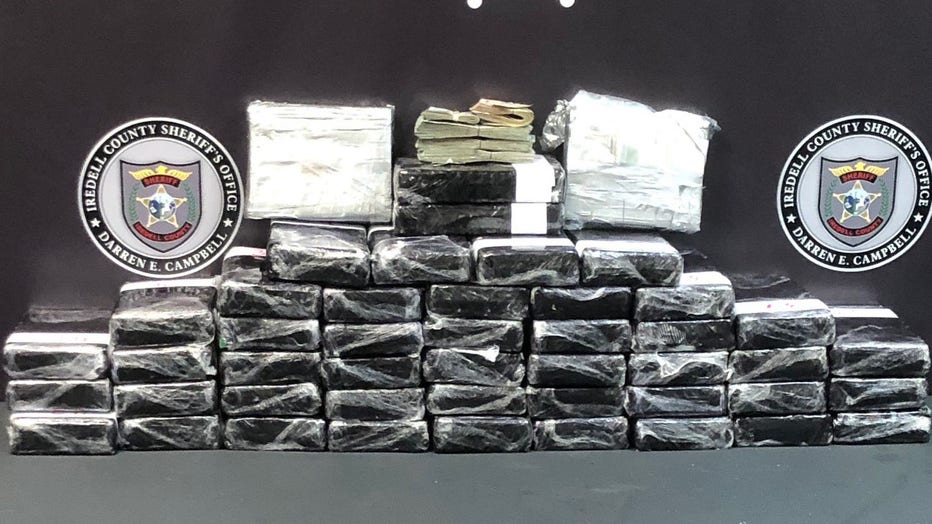North Carolina traffic stop uncovers enough fentanyl to kill 27 million people

Fentanyl crisis: Father's emotional testimony of losing son during border security hearing
Brandon Dunn, Co-founder of Forever 15 Project, emotionally tells the story of his late son dying of a fentanyl overdose. U.S. House held it's first major meeting with the GOP controlled majority focusing on border security.
IREDELL COUNTY, N.C. - Authorities in North Carolina said a traffic stop yielded so much fentanyl it was enough to kill nearly 27 million people, more than twice the state's population.
The Iredell County Sheriff’s Office said its Interstate Criminal Enforcement Team (ICE) conducted a traffic stop Sunday when they pulled over a 2014 Freightliner tractor-trailer on Interstate 77.
Inside the truck were Lorenzo Juan Arreola, 44 Years Old, from Sunland Park, New Mexico, and Lucio Eduardo Chavira Avila, 33 Years Old, from Parral Chihuahua, Mexico. Authorities said they were going from Charlotte, North Carolina to Philadelphia with a load of tile.
RELATED: Supreme Court grapples with OxyContin maker's bankruptcy deal, with billions of dollars at stake
The deputies' canine dog detected the presence of narcotics inside the vehicle.
During a search, authorities uncovered 53.6 kilos (118lbs) of suspected fentanyl possibly mixed with cocaine. Money was also discovered in excess of $100,000.
The sheriff said the estimated value of the drugs was $30,000.00 per kilogram. The total street value would translate to approximately $3,752,000.00.

North Carolina authorities said they uncovered enough fentanyl to kill 27 million people in a traffic stop. (Credit: Iredell County Sheriff's Office)
Authorities said, according to the Drug Enforcement Administration website, "One kilogram of Fentanyl has the potential to kill 500,000 people."
"This math shows that 53.6 kilos could potentially kill 26,800,000 people," authorities posted on its Facebook page. "North Carolina has a population of 10.7 million, so this would cause death to the entire population of North Carolina 2.5 times over."
The men were arrested and transported to the Iredell County Detention Center and were each issued a $3.5 million secured bond. Federal investigators are currently looking into the legal status of being in the U.S.
RELATED: Border Patrol agents bust driver hauling more than $3.5M in fentanyl pills on California interstate
A synthetic opioid that’s considered exponentially more addictive than heroin, fentanyl is now the leading cause of death for Americans ages 18 to 49. A tiny amount, 2 milligrams, ingested into the body can be fatal.
The drug is frequently mixed into the supplies of other drugs or pressed into counterfeit prescription pills, like oxycodone. Some people never know they are taking it.
More than 100,000 deaths a year have been linked to drug overdoses since 2020 in the U.S., about two-thirds of those are related to fentanyl. The death toll is more than 10 times as many drug deaths as in 1988, at the height of the crack epidemic.
Many of the GOP presidential candidates say they would use military force against Mexico in response to the trafficking of fentanyl and other synthetic opioids. But analysts and nonpartisan experts warn that military force is not the answer and instead fuels the racism and xenophobia that undermine efforts to stop drug trafficking.
Democrats also face immense political pressure on border issues heading into next year’s election. The White House has funded national programs to reduce fentanyl overdoses and sanctioned Chinese companies blamed for importing the chemicals used to make the drug.
RELATED: 'I will shoot you': Oxycodone stolen from CVS pharmacy in Dupont Circle during armed robbery
The White House has said the administration imposed targeted sanctions and blamed Republicans in Congress for blocking a request for an additional $800 million to fight fentanyl trafficking, which includes money for law enforcement.
Mexico has failed to address its problem with fentanyl production and trafficking. Mexican President Andres Manuel López Obrador repeatedly denies his country is producing the synthetic opioid despite enormous evidence to the contrary.
Border agents seized nearly 13 tons (12,000 kilograms) of fentanyl at the U.S.-Mexico border between September 2022 and August, according to U.S. Customs and Border Protection.
The Associated Press contributed to this story. This story was reported from Los Angeles.

